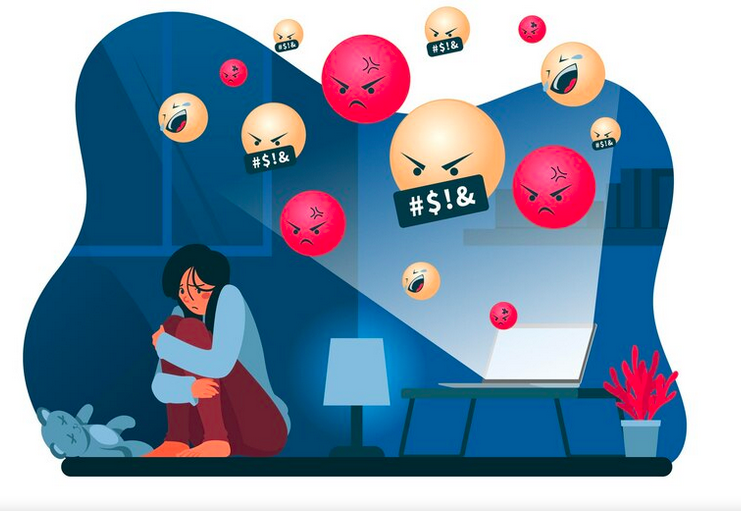After experiencing severe cyberbullying, Priyanshu Yadav, popularly known as Pranshu, a 16-year-old gay adolescent, sadly committed suicide in Madhya Pradesh. Pranshu, a self-taught makeup artist, received over 4,000 hate comments on a viral post of them wearing a sari for Diwali. An avid social media user, Yadav aspired to be as famous as YouTuber James Charles someday. The precise reason behind Pranshu’s suicide remains unknown, but there is no doubt that the severe homophobic harassment they experienced was brutal.
Despite Kerala’s reputation for progressiveness, the state has seen unprecedented amounts of cyberbullying directed towards LGBT people, especially during the recent Pride March in Malappuram. Members of the LGBTQ+ community have reported a surge in online violence, prompting some to stage a demonstration at the state Secretariat, and petition Chief Minister Pinarayi Vijayan for government intervention.
Queer poet Adarsh E, aka Aadhi, highlights the growing severity of the problem by detailing how trolls bombard gay people with hateful words, casting doubt on their identity and very existence. These anonymous internet trolls spread hatred citing false scientific arguments in an attempt to undermine transgender identities and homosexuality.


The rising visibility of LGBTQ+ people in society has led to a change in the nature of attacks, according to Syama S. Prabha of the NGO Queerythm. Attacks have grown more organised and sophisticated. Fake profiles are frequently organised in groups for actively targeting and threatening LGBTQ+ individuals.
Yes Kerala, an online group known for spreading homophobia and transphobia, has actively opposed LGBTQ+ events, contributing to the hostile online environment. Even LGBTQ+ allies like Malavika Binny, History Department Head at Kannur University, have faced cyberbullying for advocating gender and queer issues.
In January 2024, the Kerala High Court directed the Inspector General of Registration to look into the registration validity of the Youth Enrichment Society (YES) Kerala, which was accused of making disparaging remarks about the LGBTQIA+ community. This decision was made in response to a petition filed by LGBTQIA+ individuals and activists accusing YES Kerala of hate speech while operating as a scientific and literary society.
Government pleader Sunil Kumar Kuriakose mentioned two ongoing cases against YES Kerala in Malappuram. The court refrained from further comments to avoid influencing the ongoing trials but directed an examination of YES Kerala’s registration. The court emphasised the seriousness of cyberbullying against LGBTQIA+ individuals and ordered action against hate speech. Petitioners sought an inquiry into YES Kerala’s activities, registration cancellation, and removal of derogatory posts. YES Kerala allegedly spreads anti-LGBTQIA+ content, claiming to protect the younger generation from “wokeism” and “rainbow propaganda.”
The Kerala High Court addressed cyberbullying against LGBTQIA+ individuals, stressing government intervention. Justice Devan Ramachandran emphasised citizens’ right to prejudice-free living.
The court ordered action against cyberbullies, highlighting online accountability. Additionally, it directed an investigation into YES Kerala by the State Police Chief, responding to allegations of spreading hate speech against LGBTQIA+ individuals. The case underscores the urgency of combating LGBTQIA+ discrimination and hate speech in Kerala.
The first transgender lawyer in Kerala, Padma Lakshmi, has experienced discrimination at work and online abuse, highlighting the widespread anti-queer sentiment in society. Despite these obstacles, Padma highlights how critical it is to have stricter anti-discrimination laws and their successful enforcement to fight cyberbullying.
The Ernakulam Rural Cyber Police Station acknowledges the seriousness of cyber harassment and outlines procedures for filing complaints and tracking abusive profiles. However, removing fake or anonymous accounts requires cooperation from social media platforms.
Anagh, a cyberbullying victim in Kerala, spoke about the surge in online hate against queer individuals, originating on platforms like Clubhouse and later spreading to Instagram. Groups like YES Kerala exacerbate the issue, underscoring the need for stronger cyber laws. Anagh’s experience, including an attack on their disabled mother, showcases the urgency for action. The Kerala High Court’s probe into groups like YES Kerala is crucial in addressing online hate speech and discrimination, stressing the need for societal change to promote acceptance and reject hate.Not just Pranshu even Pranveen Nath’s death shocked the LGBTQ community. Nath, Kerala’s pioneering transgender bodybuilder, made headlines when they married their longtime partner, Rishana Ayshu, on Valentine’s Day. Tragically, though, Praveen’s Facebook separation announcement sparked a barrage of abusive remarks and harassment. As a result of the worsening circumstances, Praveen tragically died from poisoning. As Rishana blamed herself for Praveen’s death, she also made a suicide attempt. Online trolling has a terrible effect that has destroyed families and claimed lives.
Instances like Praveen’s stress the pervasive homophobia and transphobia rampant on social media platforms, with accounts like YES Kerala perpetuating hate campaigns against LGBTQ+ individuals. Despite efforts to address cyberbullying through legal means, the situation remains dire. The Kerala High Court intervened, underling every citizen’s right to live without suppression from propagandist ideologies.
While temporary measures may have subdued overt displays of queerphobia online, lasting change is needed. LGBTQ+ communities in Kerala hope for sustained action to combat online harassment and ensure their safety and dignity. Such tragic suicides have destroyed individuals and families only because of hatred against the LGBTQ community which highlights the pressing need for comprehensive policies and their effective enforcement to combat cyberbullying.
Story Edited by Madhupriya

